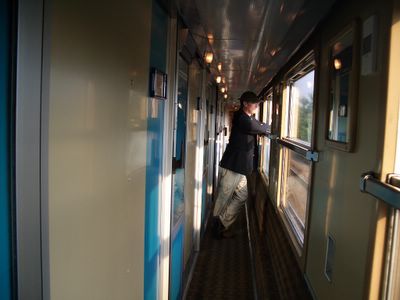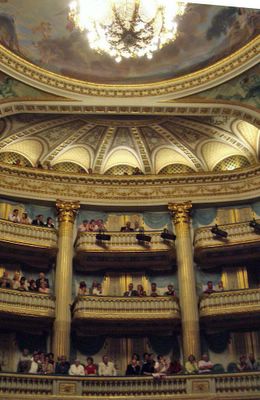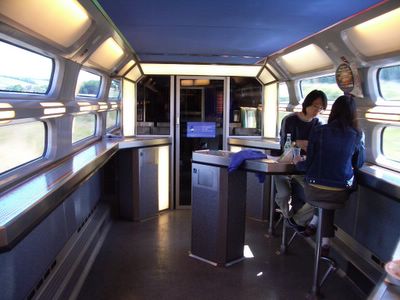Couchette of Babel

A PLAY IN ONE ACT
Scene: A first-class couchette on the train from Bordeaux to Nice. Since it is daytime, a Thursday, the bunks have disappeared into the ceiling and wall. Six passengers face each other in two rows of three seats. The train’s air conditioning is barely functioning. It is a hot day in mid-June.
Traveling backwards, closest to the corridor, LEN, an American wearing a cap with the logo of the Cannes Film Festival, reads today’s Le Monde. To his right, DARLENE, his wife, reads a child’s story in French. To her right, next to the window, sits PAUL, a Belgian man of about 40 years, in business attire. He faces an elderly French woman, MONIQUE, and to her right, facing the Americans, is an Australian couple in their mid-60s, JACK and MATILDA.
DARLENE (showing her book to LEN): What does this word mean?
LEN: Overcoat.
MONIQUE: Il fait chaud, eh?
LEN: Oui, vraiement! [DARLENE looks to him questioningly.] She says it’s hot.
DARLENE: Oui, oui! [To MONIQUE:] Vous voulez parlez avec me? Français?
MONIQUE: Oui, bien sur! Je vais voir mon soeur à Nice.
DARLENE: You are visiting your niece?
MONIQUE: Oui, nous allons restez à Nice et ensuite nous allons à Cap-Ferrat.
DARLENE (to PAUL): So you really can speak Chinese?
PAUL: Yes.
DARLENE: How interesting! Can you say something to me in Chinese?
PAUL: [something in Chinese]
DARLENE: What does that mean?
PAUL: Our computer has just moved to a new server.
MONIQUE: Ma tarte favorite ce’s la meringue.
DARLENE: Boomerang?
JACK: What’s that you say? Are you Canadian?
[LEN sighs deeply, folds up his Le Monde, slides the dour open and disappears into the corridor.]
DARLENE: No, American. We live in Denver, Colorado.
MONIQUE: J’aime beaucoup le cantaloup avec jambon. Comprenez?
DARLENE [after typing in “loup” in her digital translator]: You like wolves?
PAUL [smiling warmly]: It’s a melon. She likes a certain kind of melon.
[Several minutes of silence pass. LEN returns, apparently calmer.]
DARLENE: It’s Thursday. Your weekly cigarette, right?
LEN: Oui. Je vais mieux.
MATILDA [across Jack, to MONIQUE]: Il fait chaud, eh?
MONIQUE: Oui, oui!
DARLENE [to MATILDA]: When you travel in Italy do you parler anglais?
MATILDA: Oui.
DARLENE [offering a bag of cherries to everyone]: Voulez vous?
[As curtain falls, MATILDA fans herself with a copy of Paris Match. The other five passengers are eating cherries, smiling at each other, watching the Provence countryside sail by the large window. In the following scenes, eight hours go by. PAUL leaves the train at Marseilles, waving to the others as he walks by the window from the train platform. LEN and DARLENE get off at Cannes after warm goodbyes in English and French, Darlene kissing MONIQUE on each cheek.]
Note: Well, this is a much-exaggerated representation of our eight hours in the couchette. What’s hard to convey is how Darlene’s warmth with others, especially the French woman, completely overcomes her difficulty with French. I did get overwhelmed at one point by the cross-communication in languages, the heat, and the realization that there was nowhere to take refuge, since the train had no café car and all the other couchettes were full. I found one with a couple of smokers in it and sat down for my weekly Malboro. Back in our couchette, the six of us never exchanged names, but we did have a lot of laughs. I was left with a sense of how oddly and perfectly the lives of travelers are often thrown together, giving us the chance to travel together for a while before we reach our very separate destinations.

Friday, June 17, 2005

Darlene at the Aquarium in La Rochelle, where a rainy day had drawn big crowds to watch the fish. Here in Bordeaux, we're packing up for the 8-hour train ride back to Cannes.

Thursday, June 16, 2005
View from the Baignoire

Hotel Mercure Chateau Chatron, Bordeaux
Darlene and I managed to get a surprising amount of sleep Monday on the night train from Cannes to Bordeaux. When we found our couchette, a room with two beds up and two down, a man was in one of the upper berths reading. We settled into the two lower beds, and later another man joined us to fill the room. This level of intimacy with strangers did not tempt me to ask anyone how to pronounce words in French, so the eight-hour trip passed without conversation.
In Bordeaux we spent yesterday exploring the old downtown area, settling into our hotel, and taking advantage of “Épicuriales 2005,” a collection of tents set up by the restaurants of Bordeaux, offering “un voyage gastronomique et planétaire d’exception,” a worldwide dining voyage without exception. It was located along the allées de Tourny, which leads to the Grand-Théâtre de Bordeaux, the city’s highest-starred attraction in the Michelin red guide. After lunch, we stopped by “Le Kiosque Culture” near the theater to see if anything was playing.
The young man at the counter said “La Veuve Joyeuse” an operetta by Franz Lehar, was playing (The Merry Widow), and that he had several half-priced “front row” seats. This sounded good, so we grabbed two for a total of 70 euros. Under the verity that things which are too good to be true usually aren’t, it should have been no surprise that the front row seats were in a little closet at the side of the orchestra, a “baignoire.” An older couple joined us in our baignoire, which had a total of eight chairs in it, looking out through a rectangular opening into the theater. The woman raised a metal screen from the bottom of the opening and explained that the baignoire was originally where highly placed mistresses would be seated, behind the screen, so they could watch a performance without the audience being able to see them.
The acoustics weren’t terrific in the baignoire, and there was a lot of the stage we couldn’t see. But the performance was magnificent, with a huge cast of singers and dancers, strong leads, and a large orchestra. I was glad to see that the house was packed, not a seat available that we might have tried to purchase if we’d known to ask if there was anything other than the front row of a baignoire.
During the intermission, our friends from Bordeaux, whose name I never got, took us on a tour of the theater, which was built in 1780. We made our way to the dizzying top level of seats, which is called “paradise” but it’s also referred to as a place for chickens, the woman said, because frequently children sit up there and make a lot of noise. It had a good view of the beautiful round painting on the ceiling.
Much work has been done to restore the theater, all with government money from the national and regional levels. In fact, the entire theater, with its operating costs and the renovation, is supported by public funds, the Bordeaux couple told us. There was not a single corporate sponsor’s logo to be found, which was a big difference from attending a similar cultural event in the U.S., and no list of individual patrons at various levels of giving. I’m sure there are strong arguments for either model, but my first reaction was to prefer the sense of a theater supported by enthusiasts willing to donate their own resources, as opposed to a theater for which all decisions are made by cultural government officials. It is also certain that further exploration of exactly how the Grand-Théâtre is supported would provide more-solid ground for comparisons than the comments during intermission of two theater-goers, especially since I was understanding no more than about 70 percent of what they were saying.
Darlene’s take on the difference is to note that people here seem to share a strong attachment to the theater which might be less if it were perceived to be mainly the project of corporate and individual elites. The Bordeaux couple clearly illustrated this, as did a woman at the culture kiosk who overheard our questions to the young man and urged us to attend the operetta, saying, “we’re very proud of our theater.”
I understood very little of the French spoken and sung on the stage, but the romantic comedy was simple enough to follow with the help of some internet research beforehand. When the widow and her childhood love overcame all their misunderstandings, as well as the little problem of her huge fortune, their joyous embrace was followed by a riot of dancing and singing by the entire cast, including a display of circus-like acrobatics by two male dancers leaping high and landing in full splits.
Our friend Françoise used to live near the Grand-Théâtre here in Bordeaux, and she e-mailed us to say we must see La Rochelle, just north of here, which she called “probably the best small city in France.” So today’s excursion will be to use the last of the rail pass for a two-hour train trip to La Rochelle for lunch and back.
Darlene has been struck by how this city, near the Atlantic coast, seems so much more like England than has any other place we have seen so far in France. Here the colors are sober, the lines clean and elegant, creating a no-nonsense fashion compared with the bright colors and flowing skirts she has seen in Paris and the Cote d’Azur. People seem more proper here but still very helpful and friendly, especially our baignoire-mates at the theater, as well as the woman who helped Darlene buy a white (and flowing!) skirt to wear to the theater.

Tuesday, June 14, 2005
Superbe cadeau permanent
My youngest daughter, Roo, is 26 years old today. So it’s a good day to translate a poem about a superb gift and the passage of time.
“Impromptu” is by Jules Aïm, the blind poet who, with his wife Sabine, runs the bed & breakfast where we stayed in Paris this weekend. Jules’s poems employ strong rhyming couplets, but in this first attempt at poetry translation I am going to forego the travail of finding English rhymes as musical as his in order to stay as close as I can to what I take as the meaning of the poem. The collection which he gave me draws from annual volumes which Jules prepared for friends and family. He asked his readers to select their favorites, and those are the ones he included in the collection, titled Au Fil du Temps, Poèmes 1993-2003. In English the title might be To the Thread of Time.
I’ve been working on the translation here in our apartment in Cannes this morning, accompanied by a terrific CD I bought at the Musée Picasso yesterday. It’s a compilation of music which Picasso loved, “la palette sonore de Picasso,” the liner notes say, or “Picasso’s musical palette.” I enjoy the thought that he might have listened to this music as he worked, on a phonograph, or at least had these melodies moving through his mind as he did the work of creating a world in his art which had never existed before.
IMPROMPTU
de Jules Aïm (montré avec la permission de l’auteur)
J’en pleure et j’en ris,
La vieilesse m’a supris
Au tournant d’une decade.
Les années comme une cascade,
Ont chute dans le temps,
Me laissant chancelant.
L’étonnement et l’émoi,
Lassent un trouble en moi.
Mais! il es bon de vieillir,
Avoir des bons souvenirs
Et regarder l’avenir,
Porteur de nouveaux plaisirs.
Oublions le temps qui passé,
Dur exercise qui nous lasse.
Faisons face au lendemain,
Continuité du destin.
Sourions au temps present,
Superbe cadeau permanent.
Tome IX – 19 août 2002
IMPROMPTU
I cry, I laugh as old
age sneaks up on me
at the turn of a decade.
Years, like a waterfall,
tumbling down through time,
have left me unsteady.
Astonishment, turmoil
leave me troubled.
And yet! It is good to grow old,
to savor dear memories,
to gaze into the future,
bringer of new pleasures.
Let us forget the time passed,
its hard work which wearied us.
Let us look into tomorrow
for our continuing destiny.
Let us smile now at the present,
that superb and permanent gift.
VOLUME IX – August 19, 2002
Note: For anyone looking for a great B&B in Paris, we recommend chez Jules and Sabine highly. Our high-ceilinged room was very private, separate from the house in the same building as Sabine’s studio. The double bed was comfortable. The bathroom was tiny but had a great little tub with hand-held shower. Their e-mail address is Jules.Aim@wanadoo.fr and the phone number is 33.(0)1.42.08.23.71 .
“Impromptu” is by Jules Aïm, the blind poet who, with his wife Sabine, runs the bed & breakfast where we stayed in Paris this weekend. Jules’s poems employ strong rhyming couplets, but in this first attempt at poetry translation I am going to forego the travail of finding English rhymes as musical as his in order to stay as close as I can to what I take as the meaning of the poem. The collection which he gave me draws from annual volumes which Jules prepared for friends and family. He asked his readers to select their favorites, and those are the ones he included in the collection, titled Au Fil du Temps, Poèmes 1993-2003. In English the title might be To the Thread of Time.
I’ve been working on the translation here in our apartment in Cannes this morning, accompanied by a terrific CD I bought at the Musée Picasso yesterday. It’s a compilation of music which Picasso loved, “la palette sonore de Picasso,” the liner notes say, or “Picasso’s musical palette.” I enjoy the thought that he might have listened to this music as he worked, on a phonograph, or at least had these melodies moving through his mind as he did the work of creating a world in his art which had never existed before.
IMPROMPTU
de Jules Aïm (montré avec la permission de l’auteur)
J’en pleure et j’en ris,
La vieilesse m’a supris
Au tournant d’une decade.
Les années comme une cascade,
Ont chute dans le temps,
Me laissant chancelant.
L’étonnement et l’émoi,
Lassent un trouble en moi.
Mais! il es bon de vieillir,
Avoir des bons souvenirs
Et regarder l’avenir,
Porteur de nouveaux plaisirs.
Oublions le temps qui passé,
Dur exercise qui nous lasse.
Faisons face au lendemain,
Continuité du destin.
Sourions au temps present,
Superbe cadeau permanent.
Tome IX – 19 août 2002
IMPROMPTU
I cry, I laugh as old
age sneaks up on me
at the turn of a decade.
Years, like a waterfall,
tumbling down through time,
have left me unsteady.
Astonishment, turmoil
leave me troubled.
And yet! It is good to grow old,
to savor dear memories,
to gaze into the future,
bringer of new pleasures.
Let us forget the time passed,
its hard work which wearied us.
Let us look into tomorrow
for our continuing destiny.
Let us smile now at the present,
that superb and permanent gift.
VOLUME IX – August 19, 2002
Note: For anyone looking for a great B&B in Paris, we recommend chez Jules and Sabine highly. Our high-ceilinged room was very private, separate from the house in the same building as Sabine’s studio. The double bed was comfortable. The bathroom was tiny but had a great little tub with hand-held shower. Their e-mail address is Jules.Aim@wanadoo.fr and the phone number is 33.(0)1.42.08.23.71 .
Monday, June 13, 2005

Picasso painted La Famille, “The Family,” in nearby Mougins on September 30, 1970, at the age of 88, less than three years before his death on April 8, 1973.

Sky Train

It’s no coincidence that the café car on the Train à Grand Vitesse (TGV) looks like a spaceship. The train travels at up to 200 miles per hour, and inside it’s as quiet as a library. Darlene and I happily read and dozed all the way home.
As we were getting our bags ready for departure in Cannes, an older woman was struggling with a big piece of luggage. I helped her get it down, and we visited as the train slowed and entered the station. She was traveling with her daughter, Anca Colbert, who lives in Los Angeles and said she thought she detected a “slight” American accent in my French. This made me laugh, and I thanked her for being so gracious..
Anca has a friend who owns French restaurants in Denver and Boulder, so we plan to look him up. His last name, believe it or not, is Menu. Anca also told me an organization called Le Club des Poètes in the 7th Arrondissement. We exchanged cards on the train station platform. Anca wrote her mother’s name, Paulette, on the back of her card, along with Paulette’s phone number, in case we ever need some mothering while we’re here. You never know!


